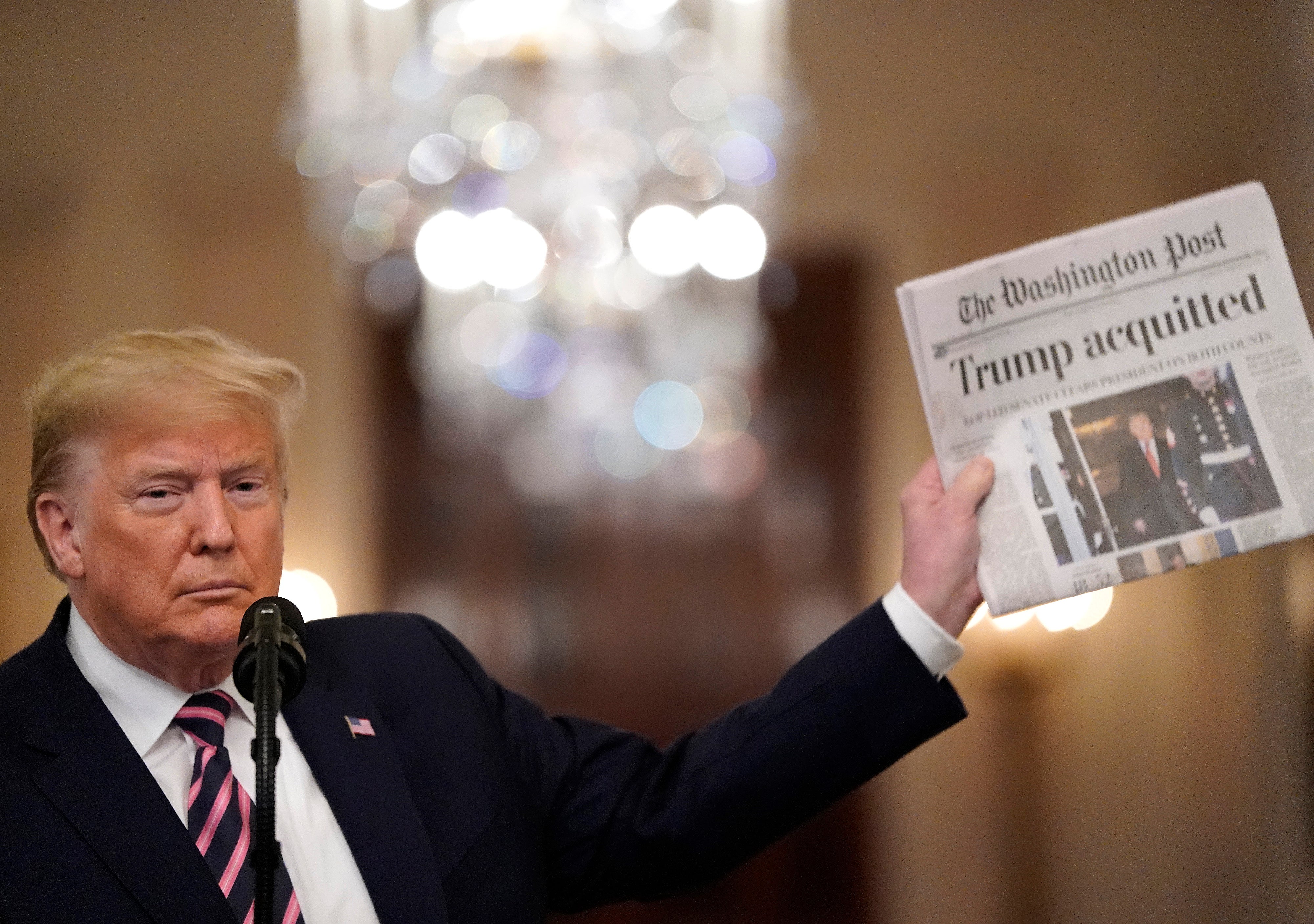From abuse of power to abuse of electoral process: How impeachment taught us little but Trump’s puppet-mastery of the GOP
History won’t remember Mitt Romney’s lone vote to convict the president so much as every other Republican voting to acquit


Your support helps us to tell the story
From reproductive rights to climate change to Big Tech, The Independent is on the ground when the story is developing. Whether it's investigating the financials of Elon Musk's pro-Trump PAC or producing our latest documentary, 'The A Word', which shines a light on the American women fighting for reproductive rights, we know how important it is to parse out the facts from the messaging.
At such a critical moment in US history, we need reporters on the ground. Your donation allows us to keep sending journalists to speak to both sides of the story.
The Independent is trusted by Americans across the entire political spectrum. And unlike many other quality news outlets, we choose not to lock Americans out of our reporting and analysis with paywalls. We believe quality journalism should be available to everyone, paid for by those who can afford it.
Your support makes all the difference.Donald Trump was acquitted by the Senate at just the third presidential impeachment trial in US history in February, and yet it might not even crack the top three most important news developments over the past 12 months.
Utah Republican Senator Mitt Romney made headlines at the time for becoming the first member of an impeached president’s party to convict him.
But the real story — how the history books will remember the saga — is how every single other Republican in Congress stuck by Mr Trump's side.
With so many different factors contributing to the electoral landscape this past fall — the Covid-19 pandemic, a reignited racial justice movement, voter suppression — it is mere speculation how much of an impact that cohesion had on Republicans clinging to power in the Senate (for now).
At the time, Senate Majority Leader Mitch McConnell was confident Democrats’ failed impeachment had been “a colossal political mistake".
The Kentucky Republican was clear-eyed that the electoral consequences may not last through the fall, informed by decades of experience that the American public has a very short political attention span.
But he was bullish.
“Every one of our people in tough races — every one of them — is in better shape today than they were before the impeachment trial started,” Mr McConnell said at a news conference after the impeachment votes on 5 February.
The politics of impeaching Mr Trump were always going to be tricky for Democrats.
Late in 2018, after the party had taken back the House majority, incoming Judiciary Chairman Jerry Nadler told me he intended to avoid a partisan impeachment process in the next term at all costs.
This was more than a year before the president withheld military aid from Ukraine to boost his political prospects, the basis for his eventual impeachment.
“If you’re serious about removing a president from office, what you’re really doing is overturning the result of the last election,” Mr Nadler told me at Roll Call at the time. “You don’t want to have a situation where you tear this country apart and for the next 30 years half the country’s saying ‘We won the election, you stole it.’”
Well, it turns out Mr Nadler didn't get his wish on either account (although impeachment had no bearing on the second of those): by and large, Republicans maligned the impeachment process, and Mr Trump’s White House has been a spigot of misinformation and discredited conspiracy theories claiming the 2020 election was stolen from him in the weeks since 3 November.
While the most ardent Trump loyalists in both chambers justified his behaviour with Ukraine, a substantial handful of GOP senators acknowledged the president had abused his power — just not enough to remove him from office.
“I think it was a mistake. ... I think he shouldn't have done it,” retiring GOP Senator Lamar Alexander of Tennessee said of Mr Trump’s attempts to leverage military aid to Ukraine for his own political benefit. But the impeachment charge — abuse of power — was “such a vague term,” he said, “it doesn't mean anything”.
For some, such as Florida Senator Marco Rubio, whether Mr Trump's actions constituted an impeachable offence or not didn't even matter.
"Just because actions meet a standard of impeachment does not mean it is in the best interest of the country to remove a President from office,” Mr Rubio wrote in a blog post at the time.
“I will not vote to remove the President because doing so would inflict extraordinary and potentially irreparable damage to our already divided nation.”
Americans achieved the same end result nine months later when they voted Joe Biden to be the next president, rendering the impeachment debate more historically symbolic of a time of intense American division than academically substantive.





Join our commenting forum
Join thought-provoking conversations, follow other Independent readers and see their replies
Comments